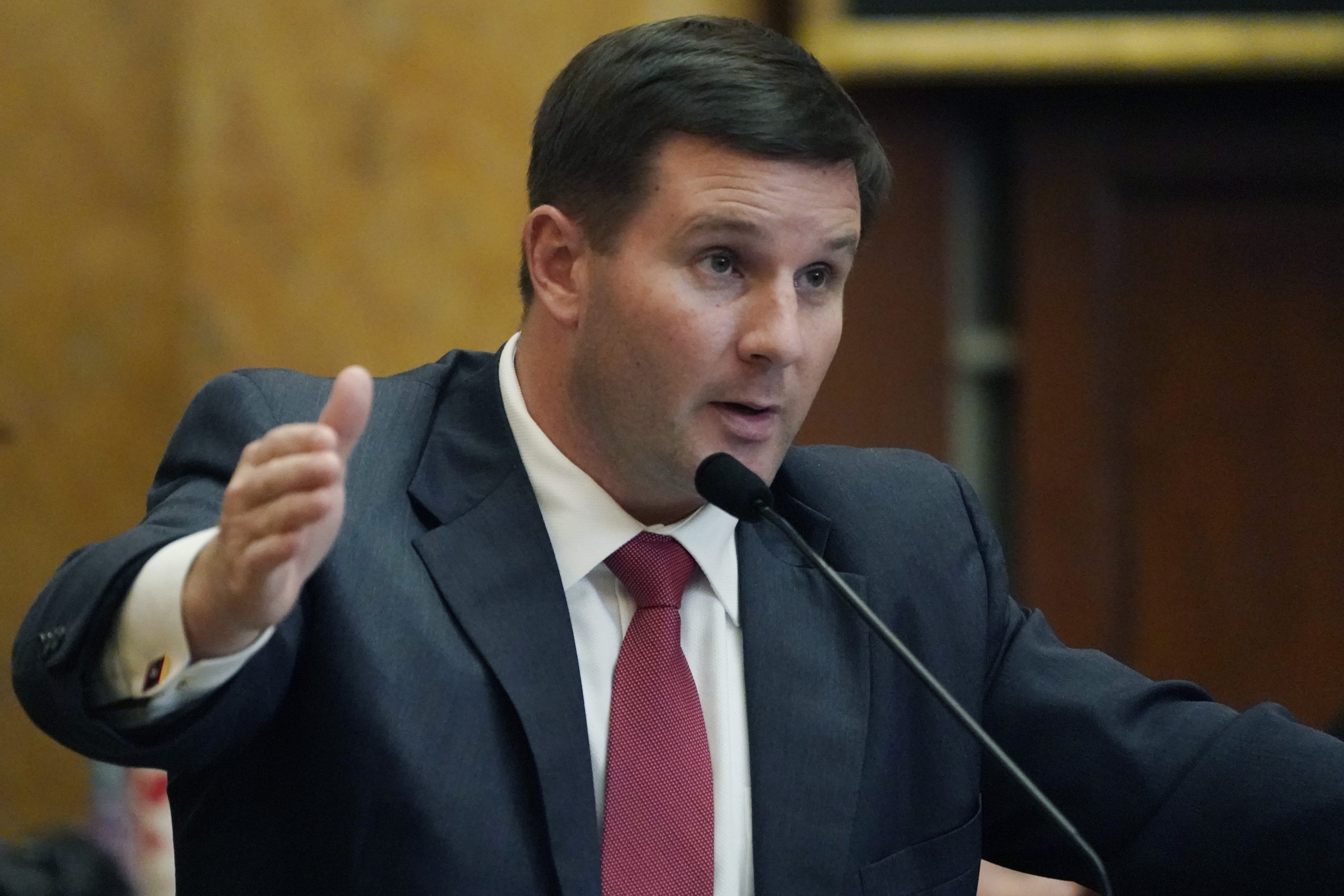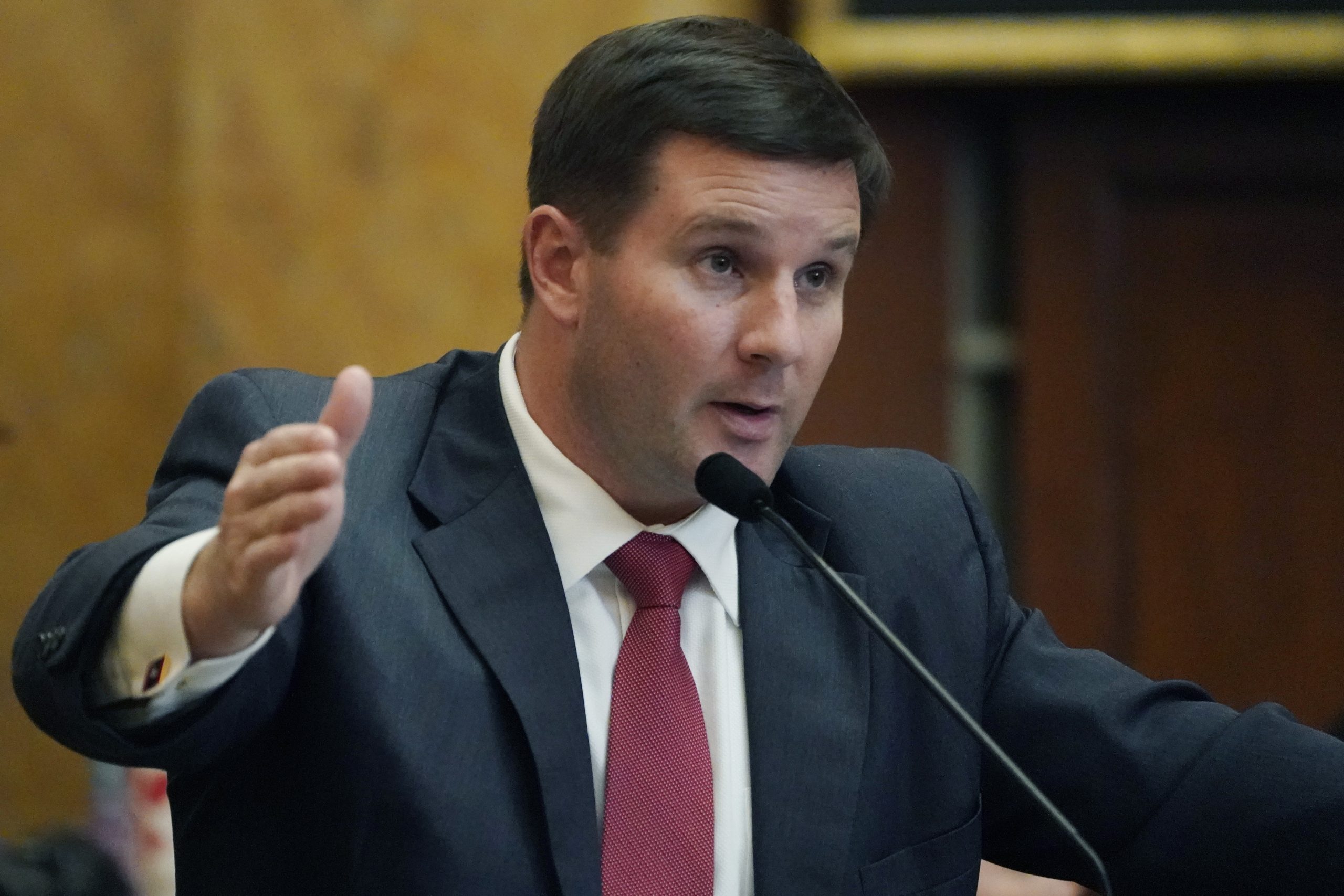Mississippi Today
Constitutionality of House Bill 1020 comes into focus


Constitutionality of House Bill 1020 comes into focus
A host of elected officials and attorneys who are increasingly scrutinizing House Bill 1020 say the original version of the legislation is likely unconstitutional — a point looming over lawmakers as they continue to debate and change the bill at the Capitol.
The bill, which passed the state House last month after four hours of debate, received national attention for seeking to create an appointed judiciary within the Blackest large city in the nation while all other similar judicial posts in the state are elected. It would also have broadly expanded jurisdiction of the white appointed state police department inside the Jackson city limits.
Many lawmakers have publicly argued the bill violates the U.S. Constitution because it denies a right to vote to the city’s 80%-plus Black population and allows the judges to be appointed by a white chief justice of the state Supreme Court.
“Only in Mississippi would we have a bill like this … where we say solving the problem requires removing the vote from Black people,” Rep. Ed Blackmon, D-Jackson.
But Jackson Attorney Luther Munford, who specializes in constitutional law and previously served as the head of former Gov. Ray Mabus’ judicial nominating committee, recently opined the bill is unconstitutional on another level. He argues it creates a judicial system that is not allowed by the Mississippi Constitution.
“The Mississippi Constitution does not allow the displacement of elected judges. To be constitutional, the new court would have to be ‘inferior’ to elected judges and subject to their review,” Munford wrote in a recent Northside Sun op-ed. “Moreover, there is nothing in the Mississippi Constitution that would allow the chief justice of the Mississippi Supreme Court or anyone else to do what the bill asks, i.e. to appoint its members. The constitution does not contemplate filling any permanent judicial office by appointment, and the temporary appointing powers it gives belong exclusively to the governor.”
The permanent, appointed judiciary section recently was stripped completely from the House bill by the Senate. The Senate passed its version of the bill Tuesday, only including temporarily appointed judges to cover all of Hinds County, not just the Capitol Complex district.
The Senate version now goes back to the House, where leaders can choose to accept the Senate changes or invite conference to try to work out the differences.
READ MORE: Senate passes House Bill 1020 over opposition from Jackson lawmakers
Even though the Senate stripped the language creating the separate judicial district with the appointed judges, those provisions will remain alive this session and could be reinserted in the bill later in the process with the agreement of Senate leaders.
At one point, even Gov. Tate Reeves, who often has been critical of the elected leadership in Jackson and has brashly highlighted the city’s crime problems, seemed to question the constitutionality of the bill after it passed the House.
Reeves said in February his office was working with legislative leaders “to get to the point” where the bill provides “safety and security to the citizens of Jackson while at the same time meet(ing) constitutional muster and otherwise.” He said there was still work to do on the legislation.
But a few days later after the Senate Judiciary A Committee stripped the appointed, permanent judges from the bill, the Republican governor seemed less pleased with the proposal.
“The bill that was amended in the Senate I thought took a pretty big step back in terms of just sending money to the same entities and institutions that exist now, and I don’t think that is the right approach,” Reeves said.
When was asked if he would sign the bill in the version that passed the Senate Judiciary A Committee, Reeves said he hopes work continues on the legislation.
“I am hopeful a bill gets to me I can sign, but I don’t think it would be that one,” he said.
The Senate proposal would continue to allow judges appointed by Chief Justice Michael Randolph to hear cases in Hinds County through the end of 2026. But in 2026, a new judge would be elected and the appointed judges would be removed.
The effort is being undertaken, Republican leaders say, to help deal with crime and a backlog of criminal cases in Hinds County.
There already exists in the city of Jackson a legislatively created Capital Complex Improvement District where a state police force has jurisdiction. The House proposal would expand the district to cover more affluent and whiter areas of Jackson.
Instead of expanding the district, the Senate proposal would provide the state police jurisdiction throughout the city and require city officials and Public Safety Commissioner Sean Tindell to reach agreement on how that jurisdiction would work.
Many Jackson elected officials say a major problem with the Senate proposal is that it gives the final say over police jurisdiction to the state and not the city. Jackson Mayor Chokwe Antar Lumumba, who oversees the Jackson Police Department, has said he will not sign a contract with the state if the current Senate proposal passes.
The author of the original House version is House Ways and Means Chair Trey Lamar, a Repubnlican from Senatobia. He has reiterated there is no racist intent with the legislation.
“The Mississippi House is trying to help, not hurt, Jackson,” said Lamar on social media. Just two of the 38 Black members of the House voted in favor of the original proposal. No Black member of the Senate voted for the amended proposal.
Lamar argued the bill is constitutional. He said the Mississippi Constitution allows the Legislature to create “inferior courts,” and under his legislation the rulings of the appointed judges would be subject to review by the four existing elected judges in Hinds County.
But Munford said the process of appealing decisions of the appointed judges to the elected judges, as spelled out in the bill, is unworkable. Plus, the state constitution gives only the governor the authority to appoint judges — when a vacancy occurs and then only to the next election.
Lamar pointed out that state law does give the chief justice the authority to appoint judges in certain instances, such as to hear election challenges or when the judges in a district recuse themselves from the case.
This article first appeared on Mississippi Today and is republished here under a Creative Commons license.
Mississippi Today
On this day in 1977, Alex Haley awarded Pulitzer for ‘Roots’

April 19, 1977

Alex Haley was awarded a special Pulitzer Prize for “Roots,” which was also adapted for television.
Network executives worried that the depiction of the brutality of the slave experience might scare away viewers. Instead, 130 million Americans watched the epic miniseries, which meant that 85% of U.S. households watched the program.
The miniseries received 36 Emmy nominations and won nine. In 2016, the History Channel, Lifetime and A&E remade the miniseries, which won critical acclaim and received eight Emmy nominations.
This article first appeared on Mississippi Today and is republished here under a Creative Commons Attribution-NoDerivatives 4.0 International License.![]()
Mississippi Today
Speaker White wants Christmas tree projects bill included in special legislative session

House Speaker Jason White sent a terse letter to Lt. Gov. Delbert Hosemann on Thursday, saying House leaders are frustrated with Senate leaders refusing to discuss a “Christmas tree” bill spending millions on special projects across the state.
The letter signals the two Republican leaders remain far apart on setting an overall $7 billion state budget. Bickering between the GOP leaders led to a stalemate and lawmakers ending their regular 2025 session without setting a budget. Gov. Tate Reeves plans to call them back into special session before the new budget year starts July 1 to avoid a shutdown, but wants them to have a budget mostly worked out before he does so.
White’s letter to Hosemann, which contains words in all capital letters that are underlined and italicized, said that the House wants to spend cash reserves on projects for state agencies, local communities, universities, colleges, and the Mississippi Department of Transportation.
“We believe the Senate position to NOT fund any local infrastructure projects is unreasonable,” White wrote.
The speaker in his letter noted that he and Hosemann had a meeting with the governor on Tuesday. Reeves, according to the letter, advised the two legislative leaders that if they couldn’t reach an agreement on how to disburse the surplus money, referred to as capital expense money, they should not spend any of it on infrastructure.
A spokesperson for Hosemann said the lieutenant governor has not yet reviewed the letter, and he was out of the office on Thursday working with a state agency.
“He is attending Good Friday services today, and will address any correspondence after the celebration of Easter,” the spokesperson said.
Hosemann has recently said the Legislature should set an austere budget in light of federal spending cuts coming from the Trump administration, and because state lawmakers this year passed a measure to eliminate the state income tax, the source of nearly a third of the state’s operating revenue.
Lawmakers spend capital expense money for multiple purposes, but the bulk of it — typically $200 million to $400 million a year — goes toward local projects, known as the Christmas Tree bill. Lawmakers jockey for a share of the spending for their home districts, in a process that has been called a political spoils system — areas with the most powerful lawmakers often get the largest share, not areas with the most needs. Legislative leaders often use the projects bill as either a carrot or stick to garner votes from rank and file legislators on other issues.
A Mississippi Today investigation last year revealed House Ways and Means Chairman Trey Lamar, a Republican from Sentobia, has steered tens of millions of dollars in Christmas tree spending to his district, including money to rebuild a road that runs by his north Mississippi home, renovate a nearby private country club golf course and to rebuild a tiny cul-de-sac that runs by a home he has in Jackson.
There is little oversight on how these funds are spent, and there is no requirement that lawmakers disburse the money in an equal manner or based on communities’ needs.
In the past, lawmakers borrowed money for Christmas tree bills. But state coffers have been full in recent years largely from federal pandemic aid spending, so the state has been spending its excess cash. White in his letter said the state has “ample funds” for a special projects bill.
“We, in the House, would like to sit down and have an agreement with our Senate counterparts on state agency Capital Expenditure spending AND local projects spending,” White wrote. “It is extremely important to our agencies and local governments. The ball is in your court, and the House awaits your response.”
This article first appeared on Mississippi Today and is republished here under a Creative Commons Attribution-NoDerivatives 4.0 International License.
Mississippi Today
Advocate: Election is the chance for Jackson to finally launch in the spirit of Blue Origin

Editor’s note: This essay is part of Mississippi Today Ideas, a platform for thoughtful Mississippians to share fact-based ideas about our state’s past, present and future. You can read more about the section here.
As the world recently watched the successful return of Blue Origin’s historic all-women crew from space, Jackson stands grounded. The city is still grappling with problems that no rocket can solve.
But the spirit of that mission — unity, courage and collective effort — can be applied right here in our capital city. Instead of launching away, it is time to launch together toward a more just, functioning and thriving Jackson.
The upcoming mayoral runoff election on April 22 provides such an opportunity, not just for a new administration, but for a new mindset. This isn’t about endorsements. It’s about engagement.
It’s a moment for the people of Jackson and Hinds County to take a long, honest look at ourselves and ask if we have shown up for our city and worked with elected officials, instead of remaining at odds with them.
It is time to vote again — this time with deeper understanding and shared responsibility. Jackson is in crisis — and crisis won’t wait.
According to the U.S. Census projections, Jackson is the fastest-shrinking city in the United States, losing nearly 4,000 residents in a single year. That kind of loss isn’t just about numbers. It’s about hope, resources, and people’s decision to give up rather than dig in.
Add to that the long-standing issues: a crippled water system, public safety concerns, economic decline and a sense of division that often pits neighbor against neighbor, party against party and race against race.
Mayor Chokwe Antar Lumumba has led through these storms, facing criticism for his handling of the water crisis, staffing issues and infrastructure delays. But did officials from the city, the county and the state truly collaborate with him or did they stand at a distance, waiting to assign blame?
On the flip side, his runoff opponent, state Sen. John Horhn, who has served for more than three decades, is now seeking to lead the very city he has represented from the Capitol. Voters should examine his legislative record and ask whether he used his influence to help stabilize the administration or only to position himself for this moment.
Blaming politicians is easy. Building cities is hard. And yet that is exactly what’s needed. Jackson’s future will not be secured by a mayor alone. It will take so many of Jackson’s residents — voters, business owners, faith leaders, students, retirees, parents and young people — to move this city forward. That’s the liftoff we need.
It is time to imagine Jackson as a capital city where clean, safe drinking water flows to every home — not just after lawsuits or emergencies, but through proactive maintenance and funding from city, state and federal partnerships. The involvement of the U.S. Environmental Protection Agency in the effort to improve the water system gives the city leverage.
Public safety must be a guarantee and includes prevention, not just response, with funding for community-based violence interruption programs, trauma services, youth job programs and reentry support. Other cities have done this and it’s working.
Education and workforce development are real priorities, preparing young people not just for diplomas but for meaningful careers. That means investing in public schools and in partnerships with HBCUs, trade programs and businesses rooted right here.
Additionally, city services — from trash collection to pothole repair — must be reliable, transparent and equitable, regardless of zip code or income. Seamless governance is possible when everyone is at the table.
Yes, democracy works because people show up. Not just to vote once, but to attend city council meetings, serve on boards, hold leaders accountable and help shape decisions about where resources go.
This election isn’t just about who gets the title of mayor. It’s about whether Jackson gets another chance at becoming the capital city Mississippi deserves — a place that leads by example and doesn’t lag behind.
The successful Blue Origin mission didn’t happen by chance. It took coordinated effort, diverse expertise and belief in what was possible. The same is true for this city.
We are not launching into space. But we can launch a new era marked by cooperation over conflict, and by sustained civic action over short-term outrage.
On April 22, go vote. Vote not just for a person, but for a path forward because Jackson deserves liftoff. It starts with us.
Pauline Rogers is a longtime advocate for criminal justice reform and the founder of the RECH Foundation, an organization dedicated to supporting formerly incarcerated individuals as they reintegrate into society. She is a Transformative Justice Fellow through The OpEd Project Public Voices Fellowship.
This article first appeared on Mississippi Today and is republished here under a Creative Commons Attribution-NoDerivatives 4.0 International License.![]()
-

 Mississippi Today7 days ago
Mississippi Today7 days agoLawmakers used to fail passing a budget over policy disagreement. This year, they failed over childish bickering.
-

 Mississippi Today7 days ago
Mississippi Today7 days agoOn this day in 1873, La. courthouse scene of racial carnage
-

 Local News7 days ago
Local News7 days agoSouthern Miss Professor Inducted into U.S. Hydrographer Hall of Fame
-

 News from the South - Alabama News Feed5 days ago
News from the South - Alabama News Feed5 days agoFoley man wins Race to the Finish as Kyle Larson gets first win of 2025 Xfinity Series at Bristol
-

 News from the South - Alabama News Feed6 days ago
News from the South - Alabama News Feed6 days agoFederal appeals court upholds ruling against Alabama panhandling laws
-

 News from the South - Florida News Feed7 days ago
News from the South - Florida News Feed7 days agoJacksonville University only school with 2 finalist teams in NASA’s 2025 Human Lander Challenge
-

 News from the South - Missouri News Feed7 days ago
News from the South - Missouri News Feed7 days agoInsects as food? ‘We are largely ignoring the largest group of organisms on earth’
-

 News from the South - Texas News Feed7 days ago
News from the South - Texas News Feed7 days ago1 dead after 7 people shot during large gathering at Crosby gas station, HCSO says



















































